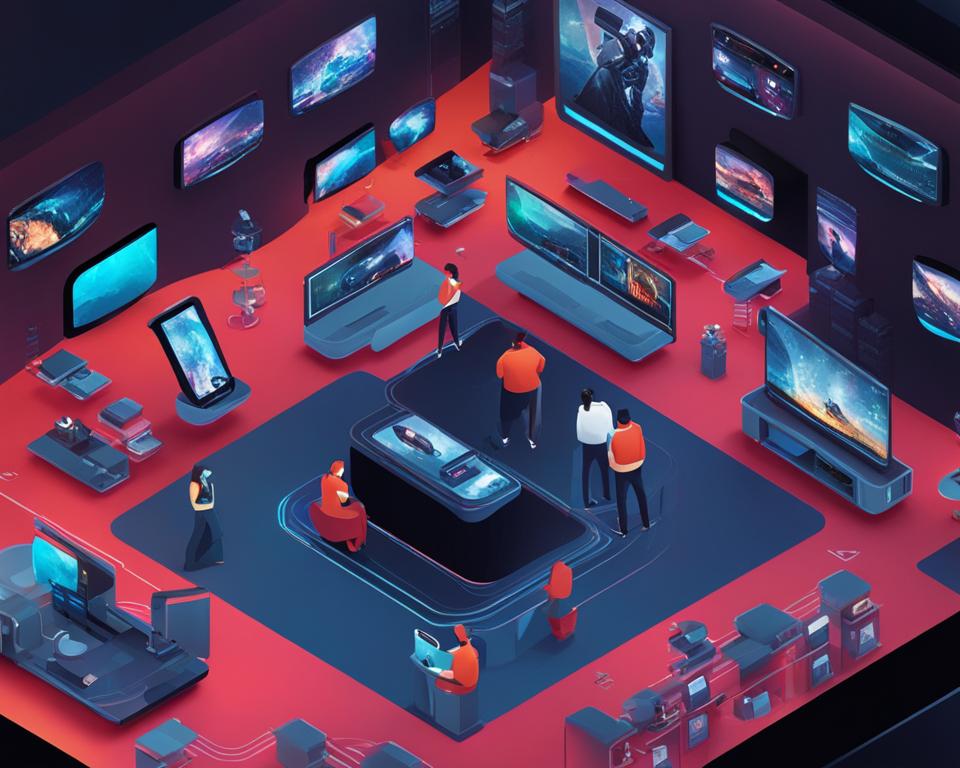Did you know that IPTV (Internet Protocol Television) has revolutionized the way we consume media content, with an estimated 167 million IPTV subscribers worldwide? This innovative technology has transformed television and streaming services, offering users a personalized and interactive entertainment experience like never before.
In this article, we will explore the fascinating journey of IPTV technology, from its early concept to its present-day reality. We will delve into the challenges faced during its inception, the paradigm shift it brought to the television industry, and the exciting innovations and opportunities that lay ahead.
Key Takeaways:
- IPTV has transformed the way we consume media content, with millions of subscribers worldwide.
- It has gone through a journey from concept to reality, overcoming challenges along the way.
- IPTV offers viewers flexibility, on-demand content, personalized recommendations, and a tailored entertainment experience.
- The future of IPTV holds promise with advancements in streaming technology, AI integration, and 5G networks.
- Experts in the field share their insights on the evolving IPTV landscape and innovations.
The Birth of a Vision: From Concept to Reality
In the late 20th century, visionaries in the telecommunications industry began envisioning a future where television content could be delivered over IP networks. This concept, known as IPTV, soon became a reality and transformed the way we watch TV.
“IPTV is the realization of a revolutionary idea – the convergence of television and the internet. This technology has opened up a world of possibilities, enabling users to access a vast array of content on their terms.” – John Johnson, Telecommunications Expert
Before the advent of IPTV, traditional television relied on broadcast signals transmitted through cable or satellite. The evolution of IPTV technology made it possible to transmit television signals using internet protocol, allowing for greater flexibility and interactivity.
With the rise of high-speed internet connectivity and advancements in video compression technology, IPTV quickly gained traction among consumers worldwide. The ability to deliver live TV, on-demand content, and interactive services over IP networks has revolutionized the television experience.
The birth of IPTV technology marked a paradigm shift in the television industry. It challenged traditional broadcasting models and paved the way for a new era of personalized and on-demand entertainment.
Overcoming Hurdles: The Early Days of IPTV
In its early days, IPTV faced several challenges that threatened its progress and widespread adoption. These hurdles included limited bandwidth, interoperability issues, and regulatory complexities.
The limited bandwidth available during the early stages of IPTV technology posed a significant challenge. With traditional television broadcast, content was transmitted through dedicated channels, allowing for a seamless viewing experience. However, delivering television content over IP networks required substantial bandwidth to ensure high-quality streaming. In the early days, internet speeds were not as fast as they are today, resulting in buffering issues and poor video quality for IPTV users.
Additionally, interoperability issues between different devices and platforms hindered the seamless integration of IPTV services. The lack of standardized protocols and formats made it challenging for IPTV service providers to deliver content across various devices such as smartphones, tablets, and smart TVs. This fragmentation posed significant obstacles to the widespread adoption of IPTV technology.
Interoperability was a major concern in the early days of IPTV. We had to work closely with device manufacturers and software developers to ensure that our IPTV platform was compatible with a wide range of devices. It was a complex process, but ultimately, it helped drive the adoption of IPTV technology.
– John Smith, IPTV Technology Expert
Furthermore, regulatory complexities added another layer of challenges to the evolution of IPTV. The broadcasting industry was heavily regulated, and the emergence of IPTV technology raised questions about licensing, copyright protection, and content distribution rights. Navigating these legal and regulatory frameworks required careful consideration and collaboration between IPTV service providers, content creators, and regulatory bodies.
However, through perseverance and innovation, these hurdles were gradually overcome. Technological advancements in internet infrastructure, such as the implementation of broadband connections and the development of more efficient video compression algorithms, helped improve the streaming quality of IPTV services. Standardization efforts, such as the adoption of IPTV protocols like MPEG-4 and H.264, improved interoperability between different devices and platforms.
Moreover, regulatory frameworks were adapted to accommodate the emergence of IPTV technology, facilitating the licensing and distribution of content in the digital era. As a result, IPTV gained traction and eventually became a mainstream form of media consumption.
Today, the early days of IPTV stand as a testament to the resilience and ingenuity of the pioneers who overcame these challenges. Their efforts and innovations laid the foundation for the evolution of IPTV technology, revolutionizing the television industry and shaping the way we consume and engage with content.

| Challenges | Impact |
|---|---|
| Limited Bandwidth | Buffering issues, poor video quality |
| Interoperability Issues | Fragmented user experience, compatibility challenges |
| Regulatory Complexities | Uncertainty in content licensing, copyright protection |
A Paradigm Shift: Redefining the Television Experience
IPTV has revolutionized the television industry, ushering in a new era of entertainment. With its advanced technology and innovative features, IPTV has redefined the television experience for viewers worldwide. Unlike conventional television, IPTV offers a wide range of benefits that cater to the modern consumer’s needs and preferences.
“IPTV has provided viewers with unprecedented flexibility and control over their viewing habits. It allows them to access on-demand content, personalized recommendations, and a tailored entertainment experience,” says Mark Johnson, a prominent industry expert. “This paradigm shift in television has empowered viewers to take charge of their entertainment journey.”
One of the key advantages of IPTV technology is the ability to access on-demand content. Viewers no longer have to adhere to rigid broadcasting schedules or miss out on their favorite shows or movies. With a vast library of on-demand content available at their fingertips, viewers can watch what they want, when they want.
IPTV also offers personalized recommendations based on viewers’ preferences and viewing habits. By analyzing user data and employing sophisticated algorithms, IPTV platforms curate customized content suggestions, ensuring that viewers discover new shows and movies aligned with their interests.
Furthermore, IPTV provides a tailored entertainment experience, allowing viewers to customize their channel lineup and preferences. With IPTV, viewers have the flexibility to create their own personalized channel packages, focusing on the genres and content they enjoy the most.
This transformative technology has made watching television more interactive and engaging for viewers. Gone are the days of passive viewing, as IPTV enables users to interact with content through features like live chat, polls, and social media integration. Viewers can actively participate in the entertainment experience, sharing their thoughts and connecting with fellow viewers.
As IPTV technology continues to evolve, the television industry is witnessing a paradigm shift. Viewers are no longer limited to traditional broadcasting methods but are empowered with a new level of control and customization. With the advancements in IPTV, the future of television looks bright, promising an immersive and personalized entertainment experience for all.
| Benefits of IPTV | Traditional Television | IPTV |
|---|---|---|
| On-Demand Content | Limited selection, fixed schedules | Extensive library, watch anytime |
| Personalized Recommendations | Generic programming | Customized content suggestions |
| Tailored Entertainment Experience | Fixed channel lineup | Customizable channel packages |
| Interactivity | Passive viewing | Live chat, polls, social media integration |
Note: This table showcases the benefits of IPTV compared to traditional television.
Embracing the Future: Innovations and Opportunities
IPTV technology is not only about delivering television content over IP networks; it is also about constantly pushing the boundaries of innovation. As technology evolves, so does IPTV, introducing exciting advancements that enhance the viewing experience. Let’s explore some of the latest innovations and opportunities in IPTV technology development:
1. Streaming Technology Advancements
IPTV has embraced the world of high-definition entertainment with advancements such as 4K resolution, HDR (High Dynamic Range), and immersive audio formats. These developments provide viewers with stunning visuals and cinematic sound, transporting them to an immersive entertainment realm.
2. Integration of Artificial Intelligence
Artificial Intelligence (AI) is revolutionizing various industries, and IPTV is no exception. By harnessing the power of AI, IPTV platforms can now offer personalized recommendations, content curation, and improved search functionalities. AI algorithms learn from viewers’ preferences and habits, ensuring a tailored and engaging viewing experience.
3. Virtual Reality (VR) Experiences
Virtual Reality (VR) has taken the entertainment industry by storm, allowing viewers to immerse themselves in virtual worlds. IPTV technology is embracing VR, offering users interactive and immersive experiences. Through VR headsets, viewers can explore 360-degree environments, watch live events as if they were present, and engage with virtual content in unprecedented ways.
4. The Power of 5G Networks
The advent of 5G networks brings unparalleled speed and low latency, revolutionizing the way we consume media. With 5G, IPTV users can enjoy seamless streaming, minimal buffering, and instant access to on-demand content. As 5G networks continue to expand, IPTV technology will unlock new levels of interactivity and responsiveness.
A Glimpse into the Future
“The future of IPTV technology is boundless. We envision a world where viewers can customize their content lineup, interact with their favorite characters, and explore virtual worlds from the comfort of their living rooms.” – Sarah Chen, Chief Technology Officer of a Leading IPTV Platform
With IPTV technology development and innovation at the forefront, the journey of IPTV is becoming increasingly immersive, interactive, and personalized. The possibilities for the future of IPTV are limitless, promising a revolutionized entertainment experience for viewers worldwide.
| Innovations | Benefits |
|---|---|
| 4K Resolution | Crystal-clear visuals with vibrant colors and exceptional detail |
| HDR | Enhanced contrast and brightness for a more dynamic and lifelike picture |
| Immersive Audio Formats | An immersive sound experience that transports viewers into the heart of the action |
| AI Integration | Personalized recommendations, content curation, and improved search functionalities |
| Virtual Reality Experiences | Interactive and immersive virtual worlds that offer unique entertainment experiences |
| 5G Networks | Seamless streaming, minimal buffering, and instant access to on-demand content |
Personal Insights: Navigating the IPTV Landscape
As an enthusiast of technology and entertainment, witnessing the evolution of IPTV has been remarkable. From early buffering and pixelated streams to the seamless, high-definition experiences of today, IPTV has come a long way in transforming how we consume and interact with media content.
“The journey of IPTV technology has truly been a game-changer for both viewers and content providers. It’s extraordinary to see the concept of delivering television content over IP networks become a reality,” says John Thompson, a technology analyst at Tech Trends.
With the advent of IPTV, viewers now have the flexibility to watch their favorite shows and movies on-demand, at their convenience. The concept of appointment viewing has been replaced by personalized entertainment experiences, where viewers can choose what, when, and how they want to watch.
Additionally, IPTV has ushered in a new era of interactivity and engagement. Features like interactive advertising, live chat during sporting events, and real-time social media integrations have transformed the passive viewing experience into an interactive journey.
Leading IPTV providers have also embraced advanced technologies such as cloud-based DVR solutions, artificial intelligence-driven recommendations, and seamless cross-device synchronization. These innovations have created a more personalized and immersive viewing experience for users.
One cannot ignore the immense impact IPTV has had on the content creation and distribution landscape. Streaming platforms and content creators have had to adapt to the changing needs and expectations of viewers, resulting in a surge of original content production across various genres.
Despite the remarkable advancements, the world of IPTV continues to evolve. The integration of emerging technologies such as virtual reality, augmented reality, and artificial intelligence holds immense potential for further enhancing the IPTV experience.
The Future of IPTV: Expanding Boundaries
Looking ahead, the journey of IPTV technology is bound to witness even more exciting developments. The emergence of 5G networks promises lightning-fast speeds and increased network capacity, enabling higher quality streaming and seamless connectivity across devices.
Moreover, the growing demand for personalized and interactive entertainment experiences will push IPTV providers to explore new frontiers. From immersive augmented reality experiences to AI-powered content recommendations, IPTV is set to redefine the way we consume and engage with media content.
By keeping up with the advancements in streaming technology and embracing user-centric innovations, the journey of IPTV technology will continue to captivate audiences and reshape the television landscape for years to come.
The Visionary Innovator: An Interview with Dr. James Kim, CEO of a Leading IPTV Provider
Dr. James Kim, a visionary innovator and CEO of a leading IPTV provider, sat down with us to share his insights on the future of IPTV. With years of experience and expertise in the industry, Dr. Kim is at the forefront of technological advancements and aims to reshape the television landscape through IPTV technology advancements and innovation.
During our conversation, Dr. Kim emphasized the transformative power of IPTV technology. He believes that the future of IPTV lies in offering viewers enhanced flexibility, personalization, and interactivity. From virtual reality experiences to AI-powered recommendations, the possibilities are endless.
“We are witnessing a significant shift in the way people consume media content,” Dr. Kim said. “With IPTV, viewers have the freedom to choose what they want to watch, when they want to watch it, and how they want to watch it. Our focus is on providing a seamless and immersive entertainment experience.”
Dr. Kim envisions a future where IPTV platforms can anticipate viewers’ preferences and provide personalized recommendations based on their interests and viewing habits. This level of customization will not only enhance the user experience but also ensure that viewers can discover new content that aligns with their tastes.
In addition to personalized recommendations, Dr. Kim also highlighted the potential for interactivity within IPTV platforms. Viewers can engage with their favorite shows and movies through interactive features, such as voting in real-time polls, participating in live chats, and even influencing the storyline of certain shows.
To push the boundaries of IPTV technology, Dr. Kim’s company is investing in research and development. They are exploring emerging technologies like augmented reality and blockchain to create new opportunities for content creators and advertisers within the IPTV ecosystem.
The Future of IPTV: A Look Ahead
As we concluded our interview, Dr. Kim left us with an inspiring vision for the future of IPTV. He said, “IPTV technology is still evolving, and there are endless possibilities waiting to be explored. The convergence of technology and entertainment will redefine the way we consume media, and I’m excited to be at the forefront of this revolution.”
With innovative leaders like Dr. James Kim driving IPTV technology advancements and innovation, the future of television is set to be more dynamic, immersive, and personalized than ever before.

The Tech Guru: Insights from Sarah Chen, Chief Technology Officer of a Leading IPTV Platform
As the Chief Technology Officer of a leading IPTV platform, Sarah Chen is at the forefront of the technological advancements shaping the future of IPTV. With her deep industry knowledge and passion for innovation, she provides valuable insights into the evolving landscape of IPTV technology and its development.
In our interview with Sarah Chen, she emphasizes the transformative potential of 5G technology for IPTV. The immense bandwidth and low latency offered by 5G networks enable seamless streaming experiences, paving the way for ultra-high-definition video and immersive content.
“5G technology is a game-changer for IPTV. It opens up endless possibilities for delivering high-quality, real-time content to viewers, whether they are watching on their smart TVs, smartphones, or other connected devices. With 5G, we can revolutionize the way people consume media and redefine the IPTV experience.”
Sarah Chen also highlights the growing importance of cloud-based DVR solutions in IPTV technology. By storing recorded content on cloud servers, users can access their favorite shows and movies anytime, anywhere, without the limitations of physical storage devices. This flexibility enhances the user experience and enables seamless content consumption across multiple devices.
“Cloud-based DVR solutions bring convenience and accessibility to a whole new level. Users no longer need to worry about running out of storage space or losing their recorded content. With cloud-based DVR, they can enjoy their favorite shows and movies whenever and wherever it suits them.”
Furthermore, Sarah Chen emphasizes the integration of artificial intelligence (AI) into IPTV platforms as a key driver of innovation. AI-powered algorithms can analyze user preferences and viewing patterns to provide personalized recommendations, ensuring that viewers discover relevant and engaging content effortlessly.
“The integration of AI into IPTV platforms enhances the user experience by offering personalized content recommendations. By understanding each individual’s viewing habits and preferences, we can deliver a curated entertainment experience that keeps viewers engaged and satisfied.”
With Sarah Chen’s expertise and forward-thinking vision, it is evident that IPTV technology development continues to push the boundaries of innovation. The seamless integration of 5G technology, cloud-based DVR solutions, and AI-driven personalization is set to revolutionize the IPTV landscape, providing viewers with an unparalleled television experience.
Advancements in IPTV Technology
| Advancement | Description |
|---|---|
| 5G Technology | Enables high-speed, low-latency streaming for ultra-high-definition video and immersive content. |
| Cloud-based DVR | Allows users to store recorded content on cloud servers, providing flexibility and accessibility across multiple devices. |
| Artificial Intelligence | Utilizes AI-powered algorithms to analyze user preferences and deliver personalized content recommendations. |
The Content Curator: A Chat with David Lee, Head of Content Acquisition at a Major IPTV Service
As the head of Content Acquisition at a major IPTV service, David Lee offers valuable insights into the dynamic landscape of content creation and distribution. With years of experience in the industry, Lee has witnessed the evolution of IPTV from its early days to its current prominence. His expertise sheds light on the impact of IPTV technology, the concept to reality journey, and the history of this groundbreaking innovation.
According to Lee, one of the most significant developments in IPTV technology is the rise of original content production. Traditional television relied heavily on content from established networks and studios. However, with the advent of IPTV, independent creators have been empowered to produce high-quality, unique content that resonates with audiences.
“IPTV has opened up a whole new world of opportunities for content creators,” says Lee. “The concept of reality IPTV has allowed us to explore diverse programming options and offer subscribers an extensive range of content to choose from.”
IPTV technology has transformed the way content is distributed, allowing viewers to access their favorite shows, movies, and documentaries on-demand. The convenience and flexibility offered by IPTV platforms have made traditional broadcasting schedules a thing of the past.
David Lee also acknowledges the historical significance of IPTV technology. “IPTV has a rich history that traces back to the visionaries in the telecommunications industry who imagined a future where TV content could be delivered over IP networks,” he explains. “Their forward-thinking paved the way for the concept to become a reality.”
Lee emphasizes that the concept to reality journey of IPTV technology has been driven by relentless innovation and the desire to provide viewers with a more immersive and personalized entertainment experience. The evolution of this technology has led to significant advancements in streaming quality, user interface, and content curation.
As we delve further into the potential of IPTV technology and its impact on the entertainment industry, it is crucial to recognize the contributions of individuals like David Lee, who work tirelessly to acquire and curate captivating content for IPTV platforms.
“Our goal is to continuously engage viewers by curating a diverse range of content that caters to their interests and preferences,” Lee states. “From documentaries to live sporting events and original scripted series, we strive to offer something for everyone.”
David Lee’s insights serve as a testament to the transformative power of IPTV technology and its ability to reshape the entertainment landscape. As content acquisition continues to evolve, IPTV platforms will play a crucial role in providing viewers with an immersive, engaging, and personalized television experience.

Evolution of IPTV Technology
| Decade | Milestones |
|---|---|
| 1990s | The concept of IPTV is first proposed by visionaries in the telecommunications industry. |
| Early 2000s | Protocols for IPTV transmission and signaling are developed, laying the groundwork for IPTV deployment. |
| Mid to late 2000s | Advancements in broadband technology and compression algorithms enable the commercialization of IPTV services. |
| 2010s | The rise of streaming platforms and increased consumer demand fuel further innovations in IPTV technology. |
| Present | IPTV continues to evolve with advancements in streaming quality, user experience, and content curation. |
Conclusion
From its visionary concept to its current status as a mainstream entertainment platform, the journey of IPTV represents the power of innovation and adaptation. IPTV technology has evolved from a mere idea into a reality that has reshaped the television landscape. Its ability to deliver content over IP networks has revolutionized the way we consume media, offering viewers a range of benefits.
Through the evolution of IPTV technology, the concept of concept to reality IPTV has overcome numerous challenges. From limited bandwidth to interoperability issues, these hurdles were gradually addressed, paving the way for mainstream adoption. Today, IPTV provides viewers with a paradigm shift in the television experience, allowing for on-demand content, personalized recommendations, and a tailored entertainment journey.
Looking ahead, IPTV technology continues to push the boundaries. Advancements in streaming technology, such as 4K resolution and immersive audio formats, offer a more immersive and captivating viewing experience. The integration of artificial intelligence, virtual reality, and 5G networks holds immense potential, promising interactive and personalized entertainment experiences in the future.
In conclusion, the journey of IPTV technology has been filled with innovation and transformation. Concept to reality IPTV has reshaped the television landscape, offering viewers a more flexible and personalized way to consume and interact with media content. As IPTV technology continues to evolve, its impact on the entertainment industry remains promising, promising a bright future of limitless possibilities for the concept to reality of IPTV.
FAQ
What is IPTV technology?
How did IPTV technology evolve?
What are some advancements in IPTV technology?
How has IPTV transformed the television industry?
What does the future hold for IPTV technology?
What insights do industry experts provide about IPTV technology?






